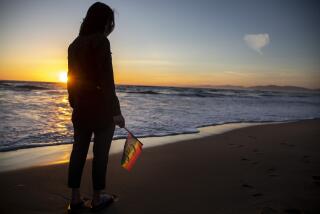Do You Know What Your Teen Is Doing?
- Share via
It’s called the “not my kid” syndrome. And recovery, according to one mother of a 16-year-old, involves a painful yanking of the head from deep in the sand.
She was stunned last month when two friends told her that her daughter had been drinking at unsupervised parties. The same day, another neighbor told her the police had been called to a party at her own house and the fleeing children left drug paraphernalia in the neighbors’ yards.
“She would have been the last kid I’d ever think. Never. Ever. She was obedient, compliant, a pure delight,” the mother said.
She said the other parents wouldn’t have known either if one hadn’t overheard a conversation between two other kids, and the other hadn’t picked up a fallen note and read it.
Recent surveys show parental denial is rampant among baby boomers--the very generation that thought it invented sex, drugs and the generation gap.
According to the Partnership for a Drug-Free America, which surveyed 9,342 preteens, teenagers and parents, teens are nearly three times as likely to have smoked marijuana than their parents think; 95% of parents said they had talked to their teenagers about drugs, but only 77% of the teens said their parents have talked to them. A mother / daughter poll of 2,000 by Family Circle and YM magazines found that 71% of mothers thought their daughters were virgins, while 63% of the teens said they were sexually active, 15% reported having had sex in their mother’s bed.
Baby boomers may be blindsided by their kids’ activities either despite or because of the fact that they know the risks only too well. Today’s parents used drugs at much higher rates than kids today.
Adolescent health expert Victor Strasburger, an Albuquerque pediatrician, said some parents are very aggressive in trying to talk to their kids, get them good sex education and drug education. “And some of them prefer the ostrich approach. Who wants to face up to bad news when you can ignore it and hope it’s not true?”
Some parents are too caught up in their own lives to notice what their children are up to. Some don’t want to see it because then they’d think they failed. Others aren’t overly concerned, believing that most kids today are no different from kids throughout recorded time.
Indeed, 80% of all teenagers do get through adolescence without serious problems. But because the remaining 20% are facing greater risks from sexually transmitted disease and new drugs such as crystal meth and crack cocaine, parents need to be careful to neither overreact, nor underreact to the threats facing their children.
Expert say the obvious key for parents who want to prevent their children’s experimentation from turning into abuse is not to abuse substances themselves or to stop sending ambivalent messages about drug use. If possible, parents need to present a united message to their children.
If, like the mother of the 16-year-old partyer, they find themselves suddenly jolted out of the Not My Kid Syndrome, they should try to remain calm to show how to manage anger and fear.
Recovering from her initial shock, that mother said she has forbidden her daughter to attend unsupervised parties, has set and is enforcing curfews. She is also trying, she said, to carve a delicate path between “not totally distrusting and not in denial.”
Strasburger said parents who don’t know how to confront their children have a secret, but often untapped, ally in their teenager’s physician. Strasburger is one of a growing number of physicians calling for an annual checkup for teenagers that would require the doctor to ask about sexual activity, sexual abuse, drugs, including cigarettes and alcohol, depression and other risk-taking behaviors, and provide assistance. “The doctor will ask them what they’ve been up to and will take appropriate steps.”
More to Read
Sign up for Essential California
The most important California stories and recommendations in your inbox every morning.
You may occasionally receive promotional content from the Los Angeles Times.













